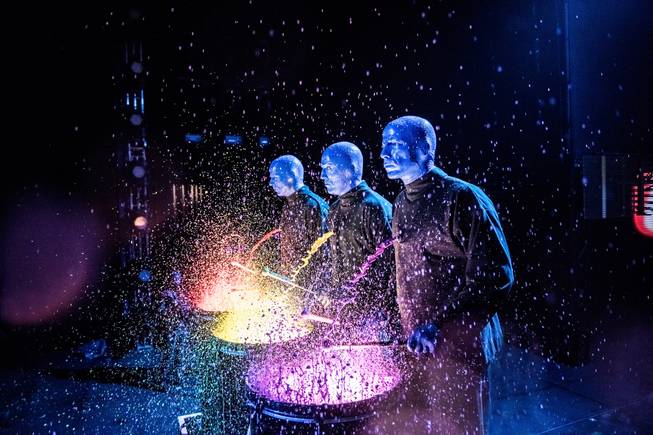
Lindsey Best via The New York Times
The Blue Man Group performs in an undated handout image. Ian Pai, who build sets and composed some of the troupe’s original music, contends that he has been underpaid in royalties for decades and has filed a lawsuit seeking at least $150 million.
Saturday, July 23, 2016 | 2 a.m.
The Blue Man Group, whose shows feature a trio of mute, alienesque, marshmallow-tossing, percussion-thumping bald and painted characters, has grown from its beginnings in the 1980s New York performance art scene to a global brand that has entertained more than 35 million people.
Now, one of its earliest artistic and musical collaborators is suing the company and its three founders, asserting that he only recently learned that he’s been underpaid for decades for contributions integral to Blue Man’s success. The lawsuit, filed by Ian Pai in New York state Supreme Court in Manhattan, seeks at least $150 million in damages.
Pai, who helped compose many of the show’s wordless songs and served as the musical director for shows in several cities, said in an interview that he feels betrayed by one-time friends who he says assured him they would take care of him financially. He vacationed with them, he said, and attended one of their weddings.
“A knife goes into the back of a friend much more easily than an enemy,” said his lawyer, Robert Piliero. “The muscles are not tensed.”
Last week, in court papers, lawyers for the defendants scoffed at Pai’s suit, calling it a “brazen attempt to increase the amount of royalties by alleging for the first time that he somehow did not understand what he was paid and why.”
When Chris Wink, Phil Stanton and Matt Goldman began painting themselves blue and performing impromptu “disturbances” on the streets of New York in the 1980s, who could have fathomed what their mix of vaudevillian slapstick humor and downtown performance art would become? Their off-Broadway show, begun 25 years ago, is still running. There are permanent shows in five other cities, including Las Vegas; Orlando, Florida; and Berlin, as well as a world tour that will make its way to the Far East this year.
The Blue Man Group 1999 album, “Audio,” was nominated for a Grammy. They’ve appeared in ads for Intel, and inspired a running gag in the TV show “Arrested Development.” In October, Black Dog and Leventhal Publishers will release the group’s first book, “Blue Man World.” And besides their own recording studios, production facilities and a 6,000-square-foot research and development lab, the founders helped start a charter school, naturally named the Blue School. (Blue Man Group, which is private, declined to provide annual revenue figures, but published reports have placed the number in the hundreds of millions of dollars.)
Pai, 47, connected with them before Blue Man Group began its off-Broadway show in fall 1991. He was a struggling artist, musician and carpenter. Besides contributing songs, he said he helped build the sets as well as the drums and instruments made of PVC pipes.
But he never had a formal, written agreement as to his share of any royalties. “I was just happy not to be bartending,” Pai said during a recent interview. “I didn’t know that I had rights.”
His lawsuit contends that in the early 1990s, the ownership allocations of the 20 songs in the original show were divvied up, and Pai’s share was 13.47 percent of the box office revenue allotted to the composer royalty pool. Over the years, the defendants say Pai has been paid weekly royalties averaging between $100,000 and $200,000 a year. But Pai argues that after noticing a sizable decrease in royalty payments in 2014, he discovered the money flowing to that royalty pool has been just 1 percent of the box office, not 6 percent, which he asserts is the industry standard.
“When you say don’t worry, we’ve got your back, that’s an implicit promise you’ll use industry standards,” Piliero said. “And they didn’t use industry standards by a long shot.”
The defendants say they never promised to pay any industry standard and that recent reductions in royalty payments were the result of reduced revenue.
The industry standard of 6 percent that Piliero speaks of has been what is typically paid for Dramatist Guild arrangements for Broadway shows, post-recoupment, and covers the music, lyrics and book, according to entertainment lawyers. Percentages for off-Broadway shows might be slightly higher because gross revenues are lower.
But the standard for a show that is instrumental, without lyrics, like Blue Man Group’s show, may not reach 6 percent, said Robert C. Harris, a senior partner at Lazarus & Harris who concentrates on entertainment and theater law and is not involved in the lawsuit. Still, absent any unusual circumstances, he said that the music component at a 1 percent royalty rate does seem low.
Since Pai has embarked on his legal crusade, the Blue Man Group has stopped paying him any royalties. Toby Butterfield of Frankfurt Kurnit, who represents Blue Man Group, said the company suspended further payments pending a court ruling as to what if anything the company legally owes him. But it is maintaining a detailed weekly accounting of what it would have continued to pay to Pai, Butterfield said.
Harris said the case was a difficult one for Pai to win, given that his agreement is oral and his claim may have come far past the statute of limitations. But if Blue Man Group had been paying him royalties over the years and then unilaterally reduced them, his claim may have a chance.
Ultimately, though, Harris has a hunch this lawsuit will be settled. “Courts are unpredictable, and they’re very expensive,” he said.


Join the Discussion:
Check this out for a full explanation of our conversion to the LiveFyre commenting system and instructions on how to sign up for an account.
Full comments policy